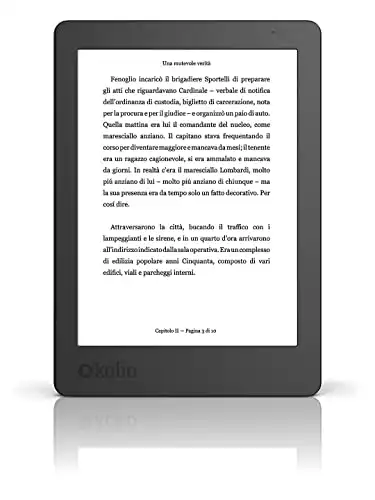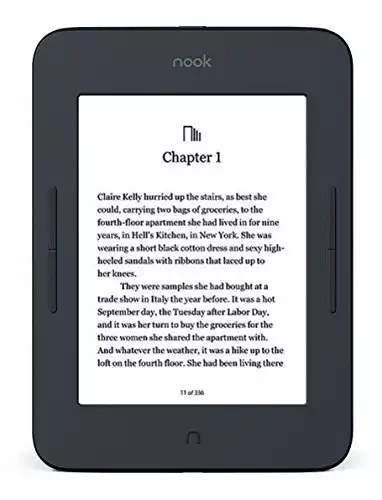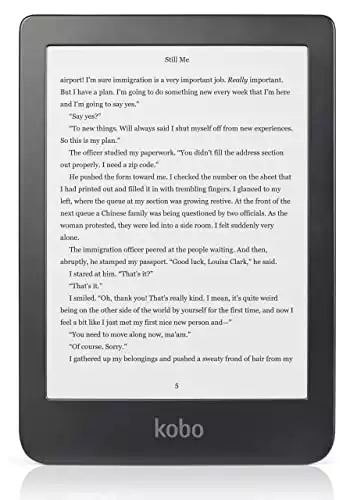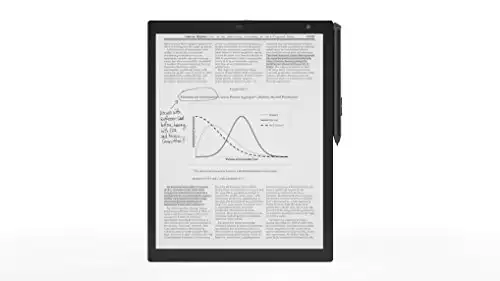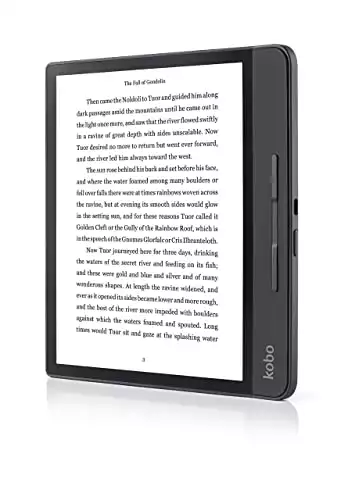We don’t blame you as Kindle dominates the market since it was the flagship product that started this whole demand. However, as the years have gone by, there are several Kindle alternatives that you may want to consider.
Why Consider E-Readers in General?
We mentioned above that e-readers aren’t distracting and are gentler on the eyes. But they also have several other perks.
Ebooks are significantly cheaper than paperback since you’re cutting out the middleman, the printing, and shipping of the physical book. They’re capable of storing several books so you’ll never lose books. You can also gain quick access to them via the tablet without hunting for that specific copy. E-readers are incredibly lightweight, making them great for portability and reading. E-readers have books in different languages, allowing you to quickly read and learn different languages rather than hunting down a foreign language copy. E-readers also have several books that you can get for free, making it a good budget option. E-readers also save a lot of space. Forget about piling up books on several bookshelves. You can now store all your books into a small tablet for easier use.
What Makes for the Best Kindle Alternative?
When finding the best Kindle alternatives, we look at the following criteria:
Connectivity. Regardless of the e-reader, you’ll need to download books wirelessly. This means connecting to a network and the internet. Having good connectivity will make this process much easier. Touchscreen. Even though touchscreens are on every piece of tech these days, it’s oddly not been a manufacturing consideration until recently. The touch screen on these Kindle alternatives will be a step up from older e-readers. Memory. The average e-reader will have between 4 GB and 8GB of memory. That’s enough memory to store thousands of ebooks and what you’ll find at entry-level smartphones in terms of memory. The Kindle alternatives we’re looking at are within this range. Screen. From the sizes on the tablet to how sharp images and text appear on the screen itself, this is where quality really matters. These alternatives have high standards for their screens. Battery. Having a long battery life means being able to go on long trips or be away from chargers for long periods of time. It can also factor in how much charge time is needed for the e-reader to be fully charged. Weight. Weight is everything to these devices. The average e-reader is about half as light as traditional tablets which means you won’t be straining yourself if you’re holding onto the tablet. You can also read in bed quite comfortably as it’s lighter than most softcover books.
5 Best Kindle Alternatives
Here are the top 5 picks for Kindle alternatives.
1. Our Pick: Kobo Aura Edition 2
With the Kobo Aura specifically, you’ll get a 212 PPI display and a 4 GB internal storage that can hold over 3000 ebooks. Other features include: Despite these great features, there are some flaws to it that you otherwise wouldn’t deal with on Kindle. These include:
This Kobo product doesn’t have access to cellular data. This means the Kobo app on your phone won’t be able to sync with this at all. It is Wi-Fi compatible. However, it’s a requirement to have access to books and downloading. And even so, the loading can be relatively slow. The touchscreen supports touch only for turning pages rather than “touch and swipe” like the Kindle.
2. Runner Up: Nook GlowLight 3
Nook is the underdog in the e-reader market, though it’s part of the literary giant, Barnes & Noble. That level of clout makes it capable of standing up against Kindle as well as Kobo. Overall, Nook delivers cheaper purchase prices for their e-readers while still offering value-for-money compared to the other brands. You start to see this already with the Nook Tablet. It’s more of a Kindle alternative to the Kindle Fire if you’re looking to compare. Some of the perks of this tablet are:
A 6-inch IPS display with 1024 x 600 resolution—the same resolution as the 1st and 2nd generation of Kindle Fire. Supports over 18 different file formats It offers a ton of memory—16 GB onboard and offers cloud storage of up to 128GB. Because it’s connected to Android, it has access to Google Play and other Android features.
But it also comes with some downsides that can hinder how much value it offers.
Because it’s connected to Android and powered by Android, it also comes with some of the issues with the operating system, such as a significantly shorter battery life compared to others. The screen is also very reflective, making the display’s readability tougher for some people.
3. Another Kobo Option: Kobo Clara HD
If some of the cons of our top picks didn’t sit well with you but you love the Kobo brand, one solid option to consider is the Kobo Clara HD. It offers a robust, entry-level e-reader that offers good features at a reasonable price. Some of the perks include:
A 6-inch, 300 PPI screen—easily matching the visual reading qualities of the higher end e-readers on the market to date. Front-lit display, making it good for reading even outside ComfortLight PRO technology makes it automatically adjust lighting based on location and time zone 8 GB of memory Smooth navigation and strong UI with the library menu Customizable display and easy to use sliders that offers you flexibility in fonts, margins, and line spaces Solid battery life of 2 to 4 weeks
Though it’s not without its downsides, which could take some getting used to.
Because the Kobo Clara focuses a lot on touch, there aren’t any buttons to balance it. So, if you’re looking to make adjustments, it’s a multi-step process compared to other brands that offer a simple button. You’re restricted to one library account at a time and if you need to switch libraries, you’ll need to log out and search for the other library. Clara also doesn’t offer previous search history making this process harder if you have multiple accounts.
For those looking for something truly unique, take a look at Sony’s e-reader. Like many of the big tech companies out there, they’ve tried their hand at e-reader technology. Apple and Windows have their tablets, and Sony does as well and has also drifted towards e-readers in particular. Hence, the DPT-RPI/B. Despite the unusual name, it still offers a lot to e-readers.
The screen is the largest we’ve seen with models offering 10-inch and 13-inch screens. It has a strong battery life—lasting about a week per charge, which is impressive considering the sheer size. It can transfer files via Wi-Fi, USB, and Bluetooth. It comes with a magnetic stylus that allows you to draw on the documents, scroll, or take notes. No other e-reader offers this. And it’s easy to read if you’re the type to read legal briefs, textbooks, manga, or comic books.
However, like Sony’s tablets, there are some big flaws that you’ll have to keep in mind.
It’s a budget option, but considering the size of it, it’s not ideal for those who read nothing but ebooks. It lacks a web browser, so there is no online store for which you can retrieve any ebooks. Every time you want to read something, you’ll have to use one of the three methods above, which can be a bit tiresome in certain circumstances. The e-reader can only display PDF formats. There are many apps available for you to convert files to PDFs and this e-reader can display them with good quality, but that extra step can be annoying for some.
5. Last Consideration: Kobo Forma
The final consideration we have on our list is the Kobo Forma. Out of the ones we’ve shown thus far, it’s on the larger screen size than others—though still smaller than Sony’s tablet. It offers an 8-inch display, which makes it just the right size for large print ebooks or those who want to be reading manga or comics. Some other perks with the tablet are:
Despite the larger screen, it’s still lightweight at seven ounces. It’s one of the few e-readers that’s IPX9 certified waterproof It offers an OverDrive feature, which means you can connect to public libraries to search and borrow ebooks. You keep the book until its due date which is displayed in an easy to spot location. Has 8GB or 32GB of storage High-quality battery life
Though, there are some downsides to the Forma you’ll need to know in advance.
The larger screen means that portability can be a slight issue, especially if your previous e-reader was much smaller. The tilt sensors can also be challenging as well as the device can easily switch to landscape mode and could be locked in automatically.
Final Thoughts
Every e-reader has its flaws, but as you can tell, there are several Kindle alternatives out there on the market. If you can overcome some of the few downsides of these e-readers, these Kindle alternatives can offer a lot in many ways that Kindle can’t. We strongly encourage you to consider these e-readers as these are great selections for those who are buying one for the first time or looking for an upgrade from their previous one. Featured photo credit: Perfecto Capucine via unsplash.com
